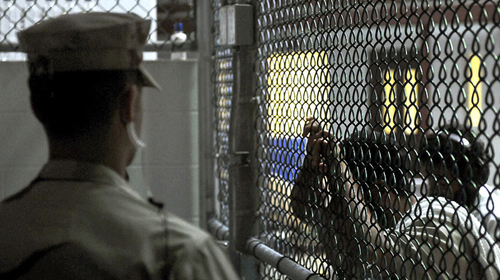
I’m writing from Guantánamo Bay, where I’ve been observing pre-trial proceedings in the military commissions prosecution of the 9/11 defendants. Earlier this week, other NGO observers and I had the opportunity to meet for a general discussion with Brigadier General Mark Martins, the Chief Prosecutor of the military commissions. During our meeting, General Martins stated that as many detainees as possible should be tried in military commissions, even as he observed that that Article III federal courts are one of this country’s “crown jewels.” That prompts the question: Why military commissions, and why not federal courts?
Defenders of the commissions often contend that battlefield exigencies justify less stringent evidentiary standards, such as for hearsay, which is information from second or third-hand sources, and which the federal criminal justice system treats as suspect. General Martins argued that the commissions’ weaker safeguards against hearsay are appropriate for statements obtained in the context of armed conflict. But as we know, In response to my question about his anticipated use of hearsay, General Martins said that such evidence would constitute only a “fraction” of the case against the 9/11 defendants; however, he added, it “could be an important fraction.” But the commissions’ weakened protections mean that defendants could be sentenced to death on the basis of hearsay; this hearsay could also shroud the fact that an original statement was obtained by coercive interrogation, making it difficult for defense counsel to challenge the statement on the grounds of involuntariness. These rules present deeply troubling conflicts with federal practice, so — again — why military commissions? One answer is that they were designed to more readily facilitate convictions.
As I learned this week, the flaws in the commission are staggering. For instance, although the presiding judge has recently issued orders that may give defendants more latitude in their ability to speak with medical experts about their torture, the American public’s ability to hear courtroom testimony about that torture is still limited in ways that violate the First Amendment. Another answer, then, to the question, “Why is our government relying on military commissions?” is perhaps that from their inception, they were designed to obscure evidence of torture.
The byzantine restrictions on the ability of defense counsel to effectively represent their clients are another obvious problem. At this week’s hearings, it became apparent that because of the extreme slowness of security clearances for the defense teams, arbitrary deadlines, and the government’s prior interference with attorney–client communications, defense counsel lacked a meaningful opportunity to present mitigation evidence at a critical early juncture. As a result, a high-level military official’s decision to refer these death penalty cases to the military commission is in question. While some of these communication issues have improved, defense counsel are still litigating the reasonableness of the hours in which they have access to their clients. At Guantánamo, visiting hours typically end at 4:00 p.m. on weekdays and are nonexistent on weekends. By contrast, the Metropolitan Correctional Center, a New York City federal jail, permits pre-trial attorney visits 24 hours a day. When Cheryl Borman, counsel for Mubarak bin ‘Attash, confronted the commander of the detention facilities at Guantánamo with that fact, he responded: “What I have here is a detention facility that holds enemy prisoners removed from the battlefield. That's not at all the same as a correctional facility holding criminals.” Except that, as Borman noted, the commander’s facilities hold many individuals who have never been charged with any crimes at all.
A final example from my time here: One defendant, Ramzi bin al Shibh, repeatedly asked for his confinement conditions to be reviewed. Mr. bin al Shibh told the judge that prison guards were keeping him awake at night by making — the government denies this — and his counsel argued that Mr. bin al Shibh has been so sleep-deprived that he’s unable to participate meaningfully in the hearings. This issue has come up previously, and Judge Pohl long-ago ordered Joint Task Force GTMO to stop any sounds and vibrations. Yet Mr. bin al Shibh’s complaints have continued. Explaining this predicament, defense counsel noted that commission rules, unlike federal court rules, prevent Judge Pohl from holding Mr. bin al Shibh’s guards in contempt.
I expected a discussion of alternative remedies and evidence collection to resolve this issue, but in a surprise maneuver yesterday, the government moved to have Mr. bin al Shibh examined for competency to stand trial, which brought dozens of pending motions to a halt. Now, it appears that pre-trial proceedings will resume in February at the earliest. As the ACLU has done since the start of the commissions, we will continue to monitor the proceedings at Guantánamo Bay and will report again once they resume.
Learn more about Guantánamo Bay and other civil liberty issues: Sign up for breaking news alerts, , and .

